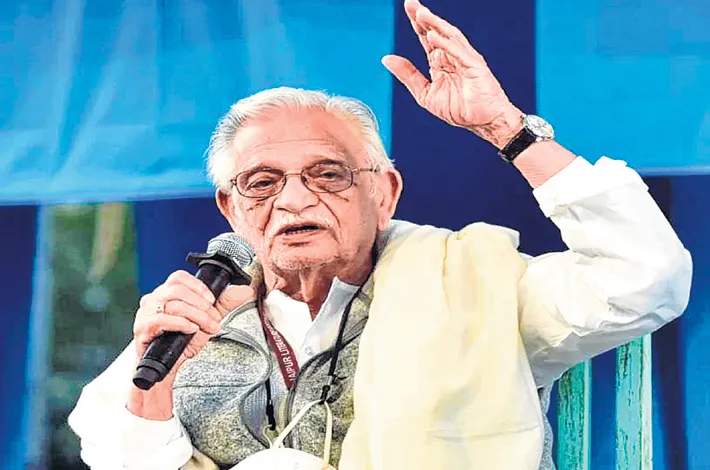Fragrance of Gulzar’s words
18-08-2025 12:00:00 AM

Celebrating 91 years of Gulzar saab — the lyricist, poet, and filmmaker whose words continue to touch generations of hearts
ऐसे उजडे आशियाने तिनके उड गये
मंजिलों तक आते आते रास्ते मूड गये
हम ठहर जाये जहां उसको शहर कहते हैं
(Homes were destroyed in such a way that even the smallest brick (twig) broke, paths turned just as we reached the destination, we call it a town where we decide to spend the night)
These lines (though not a literal translation) of a song from Namkeen by Gulzar, born as Sampoorn Singh Kalra, kind of define his journey. Born in Dina, now in Pakistan, he came to India during partition. He did quite a few odd jobs before settling down as assistant to Bimal Roy for whom he penned his first song as a lyricist in Bandini.
Sampoorn Singh Kalra chose to be ‘Gulzar’ because the word reminded him of a fragrant garden and brought back good memories. He believed that his poetic persona resonated with the mystic and myriad fragrances of a garden full of varied flowers.
Poetry was a way of expressing his inner thoughts of this shy boy who Meena Kumari found very interesting. When Bimal Roy read some of his poetry, he was quite impressed and told him to write a song for Bandini. मोरा गोरा अंग लईले, मोहे शाम रंग दयी दे...
Songs that echoed human emotions
Hrishikesh Mukherjee, editor of Bandini, a good friend of Bimal Da and his former assistant spotted talent. Gulzar was a part of his team till end. He helped him write dialogues, screenplay of Anand and again, one song in the film.
Soon Gulzar was one of the most sought-after lyricists, especially by the filmmakers who preferred sensitive, but simple poetry that touched the hearts of a common man. And the man gave brilliant songs, particularly with RD Burman. Some unique ones like मेरा कुछ सामान... which according to
Pancham sounded like a piece of news from a newspaper and had initially refused to compose! And their first piece together – मुसफिर हूं यारों – which was musically different. The rhythm was set to the tapping of the horse’s hooves since the hero is travelling in a horse carriage, but the tune was much slower.
Gulzar wrote a poem after the legendary music director’s death:
याद है बारिशों का दिन पंचम
जब पहाडी के नीचे वादी में,
धुंद से झांक कर निकलती हुई
रेल की पटरियां गुजरती थीं...!
मैं अकेला हूं धुंद में पंचम!!
Different genres of film
His film canvas as director is not so vast as his lyrics (nearly 900) but it is definitely wide-ranging. Be it a film like Koshish about mute couple with a blind friend or a political satire like Aandhi and Hu Tu Tu or Maachis which spoke about rise of anti-establishment violence in youngsters or a sensitive Mausam/Namkeen that explore tender emotions of women, or a take on Shakespeare’s Comedy of Errors – Angoor! Each film is of a different genre. And each is creatively potent.
Poetry that mirrors everyday life
The poet Gulzar flourished too. He kept writing poetry that expressed his innermost feelings about everything around him – daily affairs, love, romance, war, poverty, friendship… He was affected by most mundane and intricate, outlandish, and sensitive happenings.
He invented a new form of poetry – Triveni – which, today, is largely accepted and used.








